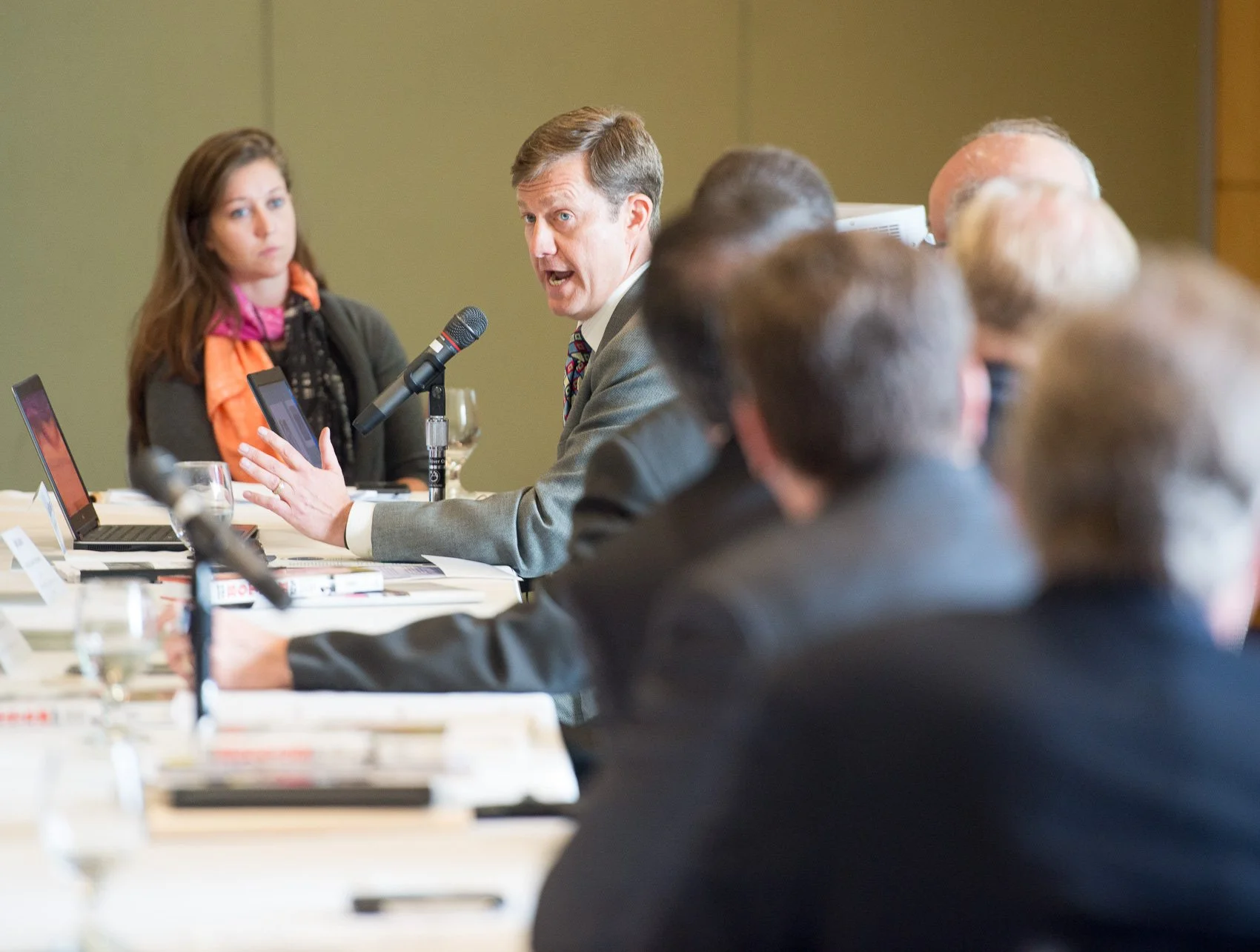Mississippi Mayors learn about Iowa water quality efforts

Sean McMahon of the Iowa Agriculture Water Association presents information about water quality during the annual Mississippi River Cities and Towns Initiative. (Photo: Joseph L. Murphy)
By Joseph L. Murphy
With the river as the backdrop, mayors from cities along the Mississippi River met in Dubuque last week to discuss topics of importance for their cities.
About 25 Mayors from communities along the river participated in the fourth annual Mississippi River Cities and Towns Initiative (MRCTI) organizational meeting. The MRCTI was created to be a new, influential, and independent voice for the Mississippi River, dramatically increasing demand for effective river protection, restoration, and management according to Colin Wellenkamp, the MRCTI executive director.
Sean McMahon of the Iowa Agriculture Water Alliance (IAWA) presented to the group about sustainable agriculture and water quality issues being faced in the state of Iowa and across the country.
“The Iowa Nutrient Reduction Strategy brings together the point source and nonpoint source communities to find the most cost-effective ways to improve water quality. It also calls for municipal waste water treatment facilities to make reductions in nitrogen and phosphorus,” McMahon told the government officials gathered. “Increasingly mayors in Iowa realize that they can make those reductions far, far cheaper if they partner with farmers and ag associations.”
McMahon told the mayors that IAWA is working with farmers to promote practices like no-till, strip-till and cover crops to improve soil health and water quality. He told them that those practices need to be combined with economic benefits for the farmers.
“We want farmers to get out of the frame of productivity at all costs,” McMahon said. “We want them to think about maximizing return on investment.”
McMahon said that with the help of precision ag companies fields can be analyzed and determine the profitability of all the acres they farm.
“Studies have shown that between three and 15 percent of the acres (being farmed) are not profitable,” he said. “Farmers are losing big money on those acres, and they are often the same acres that are seeing the most nutrient loss.”
Utilizing that information and combining it with conservation practices will help water quality while improving farmers’ bottom lines according to McMahon.
“This is not a partisan issue. There is not a red way or a blue way to clean up our water,” McMahon told the mayors. “We need to pull together the urban and rural communities to have a one water approach and have a red, white and blue way to improving our water quality future.”
Chris Coleman, the mayor of St. Paul, Minn., recognizes the importance of working on partnerships between the government sector and the ag community. Noting that in Minnesota companies like CHS, General Mills and Cargill are working toward sustainability goals.
“We all recognize that we have a vested interest in protecting the environment,” Coleman said. “Whether that’s buffer strips or cover crops those are all questions that we have to come up with answers together.”
St. Paul draws water from the Mississippi River for drinking water according to Coleman, and he says his city has a visible example of water quality. The waters from the Minnesota River and Mississippi River converge in the city while contrasting the water quality issues of both rivers.
“It is the most visible example of why we need to act to try and get a broad range of issues taken care of,” Coleman said. “This is not about beating up on the ag industry. It’s trying to figure out what are the most sustainable practices that are also good for the bottom line of the farmer. The economic interest of the farmer doesn’t have to diverge from the environmental interest or the sustainability interest. ”
Ambassador Kenneth Quinn, president of the World Food Prize Foundation, also presented at the conference about the importance of sustainability on a global scale.
“China is on a mission, and we are at risk of losing the leadership that Norman Borlaug, George Washington Carver, and Henry Wallace put into place,” he said. “The big question is how can we sustainably feed nine billion people? There has to be more food produced, but there could be ecological impacts.”
Originally published for the Iowa Soybean Association. Find more great stories at: www.iasoybeans.com/news
For more than two decades, Joseph L. Murphy has had the pleasure of meeting and connecting with people from all walks of life through photography. He has photographed presidents and heads of state, traversed the winding alleyways of the Fes Medina in Morocco, photographed the sprawling countryside and people that make up Argentina and covered events that have defined the U.S. Most recently, Murphy’s travels have taken him to Cambodia, Mexico, China, Vietnam and Ecuador.
He has spent the past 20 years specializing in agriculture photography for multiple organizations, publications and marketing projects.
A graduate of the University of Iowa, Murphy determined at an early age that his love of photography would shape his vision for life.
